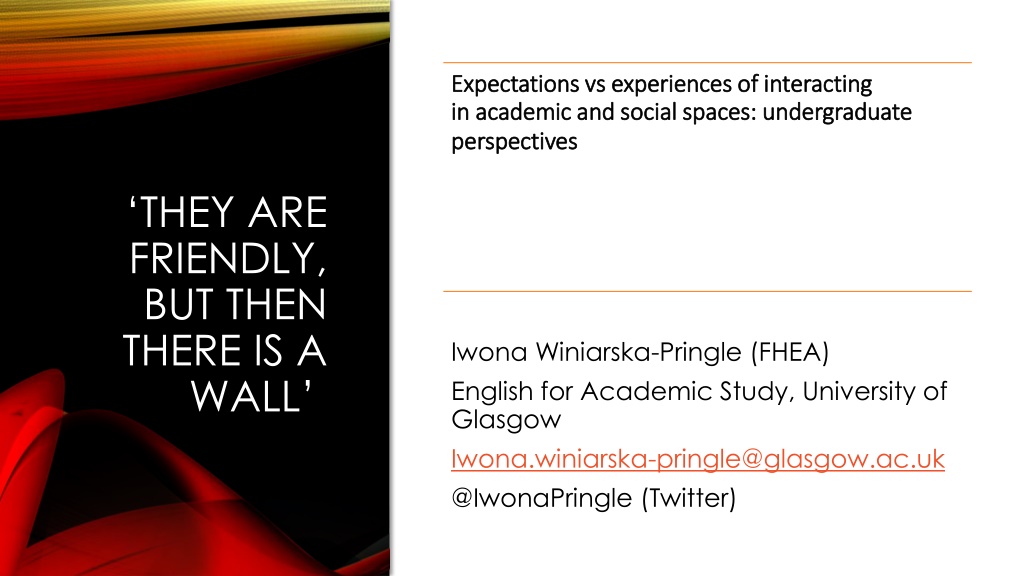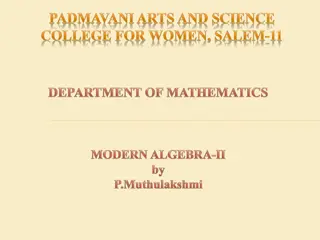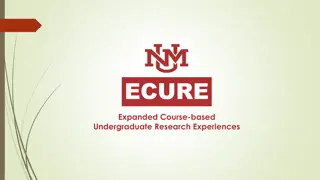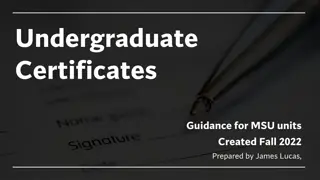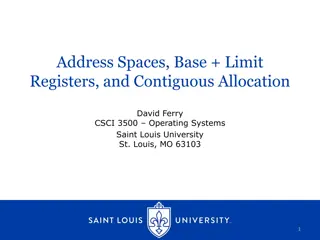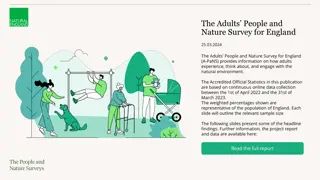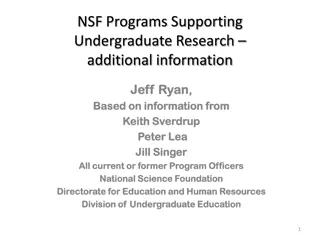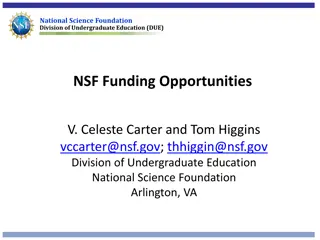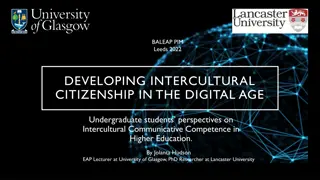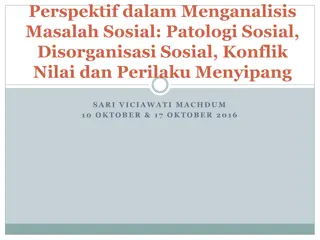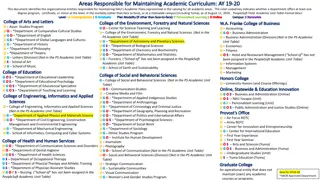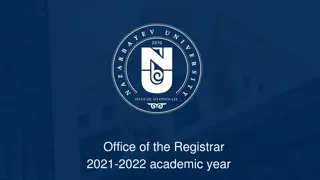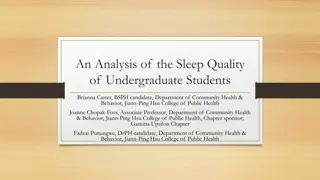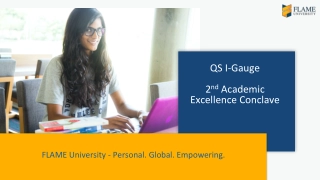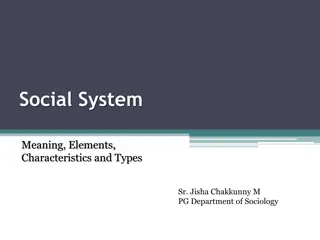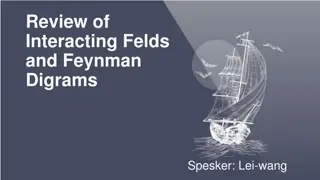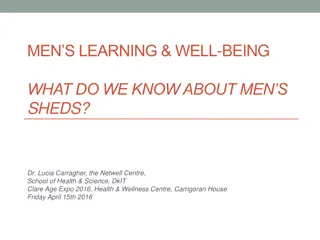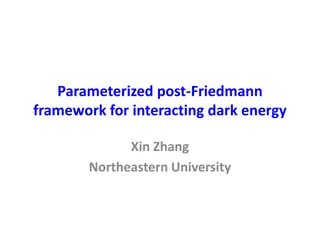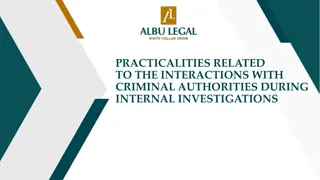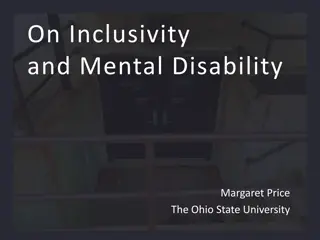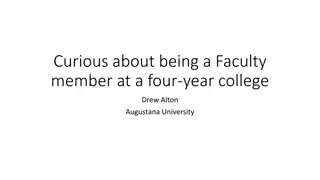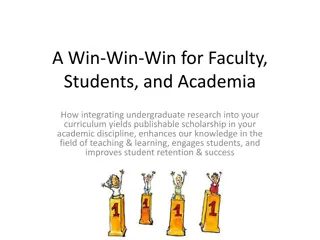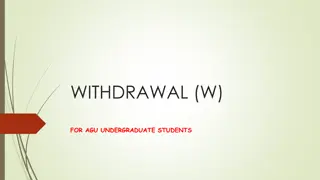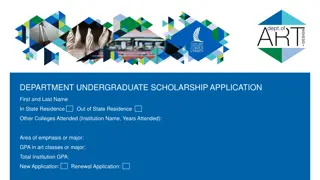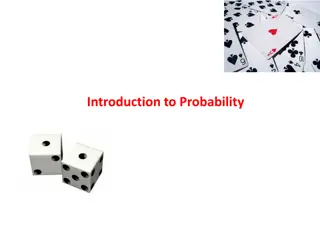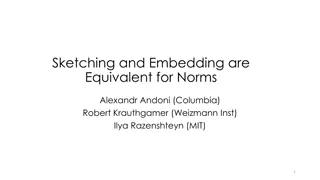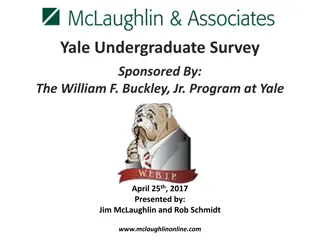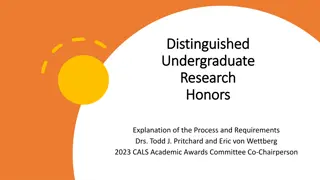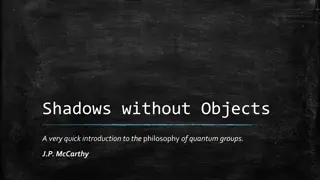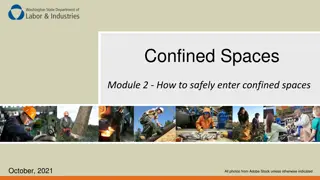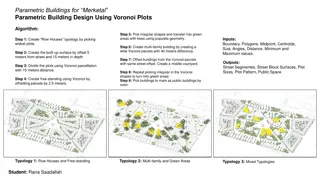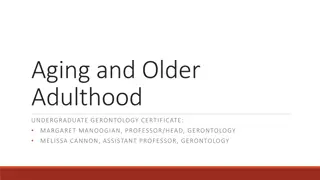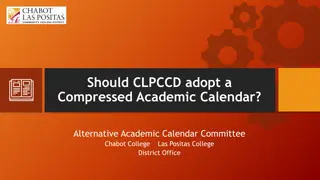Undergraduate Perspectives on Interacting in Academic and Social Spaces
"Exploring the discrepancies between expectations and experiences of undergraduate students in academic and social interactions. Insights from a study abroad context at the University of Glasgow shed light on linguistic gains, cross-cultural skills development, and challenges faced in seminar discussions. The scholarship project delves into students' expectations, experiences in Glasgow, and the role of English for Academic Purposes (EAP) in facilitating their understanding."
- Undergraduate Perspectives
- Academic Interactions
- Social Spaces
- Study Abroad
- English for Academic Purposes
Download Presentation

Please find below an Image/Link to download the presentation.
The content on the website is provided AS IS for your information and personal use only. It may not be sold, licensed, or shared on other websites without obtaining consent from the author. Download presentation by click this link. If you encounter any issues during the download, it is possible that the publisher has removed the file from their server.
E N D
Presentation Transcript
Expectations vs Expectations vs experiences of interacting experiences of interacting in in academic and social spaces: academic and social spaces: undergraduate perspectives perspectives undergraduate THEY ARE FRIENDLY, BUT THEN THERE IS A WALL Iwona Winiarska-Pringle (FHEA) English for Academic Study, University of Glasgow Iwona.winiarska-pringle@glasgow.ac.uk Iwona.winiarska-pringle@glasgow.ac.uk Iwona.winiarska-pringle@glasgow.ac.uk @IwonaPringle (Twitter)
Expectations vs reality of Study Abroad In-sessional EAP context at UoG OUTLINE Scholarship project rationale, design and findings Impact on the curriculum and assessment
STUDY ABROAD LITERATURE OVERVIEW Shared expectations Varied realities Linguistic gain: (e.g., Kinginger, 2009, Magnan & Back, 2007; Goldoni, 2013, Briggs, 2017, Howard, 2021) Immersion (quantity or frequency of exposure) not a magic wand Intrinsic motives, e.g., personal growth (e.g., Bartram, 2012, Green, 2012)and transformation (e.g., Tran, 2012, 2020) Identity and motivation (Kinginger, 2013, 2015, Benson et al. 2013, Isabelli-Garc a, 2006) English NS vs NNS (Bartram, 2012) Instrumental motives: e.g., employability (e.g., Ryan, 2020) Requires careful scaffolding and planning (e.g., Spencer-Oatey and Dauber, 2019) Intercultural skills development (e.g., Ryan, 2020)
LINGUISTIC GAIN My teaching context: In-sessional GEAP for SA students (Soc-Si, A&H, Engineering) High expectation of daily interactions hence improvement cf home country learning EAP 1 (integrated skills: essay writing + seminar discussion) EAP 2 (genres, selected features of discourse, e.g. complexity & cohesion + seminar discussion) Improvements in vocabulary growth, fluency, phonology Up to 150 students ( approx 100 in EAP 1 and 50 in EAP 2) BUT Very popular with ERASMUS as well as Exchange students Quality of contact matters: diverse, significant, active (20) credits 5 h /per week Frequent contact with home students;attending level 1 and level 3 courses; B2/C1 CERF; typically, very active and engaged in EAP classroom but.... (Briggs, 2015b, Baffoe-Djan and Zhou, in Howard, 2021)
SCHOLARSHIP PROJECT Rationale Design Assessed seminar discussion (EAP 1 & 2) explicit expectations; task repetitions; sessions to demystify seminars as academic practice; Strong course evaluation + informal group feedback BUT Difficulties with seminar task Courses = unique opportunity to interact and discuss Increasing disciplinary backgrounds - January to May 2019 - 4 sts - CoA, Soc-Si and Engineering - 2 questionnaires + follow-up 2 interviews each (start + end of term) Research questions: 1) Expectations from SA 2) Experience while in Glasgow 3) Role of EAP
EXPECTATIONS Findings: Improving speaking skills: lexis and fluency - top priority Strong motivation to be a lg user in social spaces Motivation to be a lg learner (EAP) Motivation to be active in academic spaces, but... Impact 1. Re-focused weeks 1-5 - to mirror the timing of when students experience academic genres, e.g. Pedagogic - expert assessment (lecture/textbook RA Essay/ seminar discussion) No expectation of spoken interactions in content classes - To begin the discussion on speech vs writing and expectations towards them - to introduce Oracy SKills Framework (OFS) (Mercer et al, 2017)
INTERACTIONS IN ACADEMIC SPACES IMPACT FINDINGS And you don't have to, you can't talk or you can't interact with the teacher. It s like a review of three lectures we had You can say your point of view, but you can't have a debate, conversation (Student B) - Oracy Skills Framework (Mercer et al, 2017) + Exploratory Talk (Mercer and Hodgson, 2008,; Coultas and Booth, 2019) - Dipplod et al, 2020 - oral skills development in EAP classes (British Council) very little happens [ ] it is more receiving information . more like a lecture on our questions (Student C) we spoke more before the reading week and after we mainly read, paraphrased or summarised. I don t really feel like we had many opportunities to speak (Student A) Formative Seminar discussion Feedback form - Reflection - Summative Seminar
EAP VS OTHER CONTENT CLASSES FINDINGS IMPACT Educational Mobility as a new focus for Part 2: I feel huge difference between the lecturer or tutors language and the students language. when the teachers speak [ ] they try to make it clear. But when I talked to students, everything changed. They speak faster, they don't use standard sentence. Yes. it's hard to keep up. especially in the tutorial, (Student D ) - mini survey on what makes a university international - wider context for personal stories: Advance HE report, RA and book chapters They [local students] are very friendly and helpful. But then it stops there. it's difficult to go further. There is wall. other international students noticed that too (Student B). - nuanced discussion on motivations and realitites of SA for different groups of students: I made a friend. She is French speaker, but she wants to learn English too so both tried to speak English. (Student A) - problematise native speaker, learn about global varieties of English and de-demonise co-national and international friendships,
LIST OF REFERENCES Baffoe-Djan, J.B., & Zhou, S. (2021). Close encounters of the third kind: Quantity, type and quality of language contact during study abroad. In M. Howard (Eds.). Study Abroad and the Second Language Learner: Expectations, Experiences and Development (pp. 69 90). London,: Bloomsbury Academic. Retrieved March 26, 2021, from http://dx.doi.org.ezproxy.lib.gla.ac.uk/10.5040/9781350104228.ch-004 Bartram, B. (2012). Going the other way. International Students Negotiating Higher Education: Critical Perspectives, 226. Benson, P., Barkhuizen, G., Bodycott, P., & Brown, J. (2013). Second language identity in narratives of study abroad. Palgrave Macmillan, Basingstoke Blaj-Ward, L. & SpringerLink (2017), Language Learning and Use in English-Medium Higher Education, Springer International Publishing, Cham Briggs, G. (2015b), Out-of-class Language Contact and Vocabulary Gain in a Study Abroad Context , System, 53, 129 40. Coultas, V., & Booth, P. (2019). Exploratory talk and task-based learning: A case study of a student's learning journey on an MA (education) english language teaching course. Changing English, 26(1), 30-47. https://doi.org/10.1080/1358684X.2018.1545109 Goldoni, F. (2013). Students immersion experiences in study abroad. Foreign Language Annals, 46, pp. 359 376 Green, W. (2012). The impact of friendship groups on the intercultural learning of Australian students abroad. International students negotiating higher education: Critical perspectives, 211. Howard, M. (2021). Study abroad and the second language learner: An introduction. In M. Howard (Eds.). Study Abroad and the Second Language Learner: Expectations, Experiences and Development (pp. 1 14). London,: Bloomsbury Academic. Retrieved March 24, 2021, from http://dx.doi.org.ezproxy.lib.gla.ac.uk/10.5040/9781350104228.ch-00I Isabelli-Garc a, C. (2006) Study abroad social networks, motivation and attitudes: implications for second language acquisition. In M. A. DuFon & E. Churchill (Eds.), Language learners in study abroad contexts(pp. 231 258). Clevedon, UK: Multilingual Matters.
LIST OF REFERENCES DeKeyser, R. M. (2007). Study abroad as foreign language practice. In R. M. DeKeyser (Ed.), Practice in a second language: Perspectives Kinginger, C. (2015). Student mobility and identity-related language learning. Intercultural Education (London, England), 26(1), 6- 15. https://doi.org/10.1080/14675986.2015.992199 Kinginger, C. (2013). Identity and language learning in study abroad. Foreign Language Annals, 46(3), 339- 358. https://doi.org/10.1111/flan.12037 Magnan, S. S., & Back, M. (2007). Social interaction and linguistic gain during study abroad. Foreign Language Annals, 40, 43 61. Mercer, N., and S. Hodgkinson, eds. 2008. Exploring Talk in School. London: Sage Spencer-Oatey, H., & Dauber, D. (2019). What is integration and why is it important for internationalization? A multidisciplinary review. Journal of Studies in International Education, 23(5), 515-534. https://doi.org/10.1177/1028315319842346 Ryan, J. (2020). Essential frameowrks for enhancing student success: Internationalisaing Higher Education. A guide to the Advance He Framework Tran, L. T., & Pham, L. (2016). International students in transnational mobility: Intercultural connectedness with domestic and international peers, institutions and the wider community. Compare, A Journal of Comparative and International Education, 46, pp. 560 581
